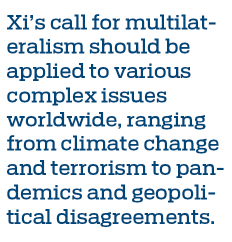Complex problems need global solutions
In a world now struggling with a raging pandemic and economic turbulence, it is reassuring that China has unequivocally expressed support for multilateralism, continuous reforms, openness and globalization while rejecting abominable unilateralism.
This commitment was reaffirmed by President Xi Jinping in his speech on Tuesday to the opening ceremony of the Boao Forum for Asia Annual Conference 2021 in the tropical island province of Hainan.
Xi urged the world to boldly embrace economic integration and said we should avoid unilateralism. Despite persistent threats of protectionism and isolationism in some societies, China's steadfast advocacy of multilateralism reinforces trade globalization and stability.
China's support for multilateral, plurilateral and bilateral cooperation in sustainable development is not just grounded in pragmatism and its modern history of being a victim of Western and Japanese colonial depredations in the 19th and 20th centuries.
It should be understood that China's championing of multilateralism-as showcased in the Belt and Road Initiative and the Regional Comprehensive Economic Partnership-ultimately stems from the ancient Chinese cultural tradition of Confucianism, which extols propriety, humaneness and righteousness.
In contrast to Western realism, which believes conflicts between states are inevitable and that the world is naturally anarchic, Confucianism promotes a naturally harmonious world under an asymmetrical system built out of mutual respect, community values and benevolence.
Western societies like the United States, the United Kingdom and the European Union should welcome this beneficent, broadminded multilateral vision. They should repudiate some of their jingoistic politicians' backward-looking protectionism, xenophobia and often virulently racist belligerence as useless, stopgap solutions to their domestic woes.
Unilateralism harms not only their countries' long-term socioeconomic welfare, but also pushes back global progress and endangers peace.
In an era of challenges, uncertainties and changes, President Xi's call for multilateralism comes amid a growing clamor among many nations. One recent example of the calamitous evils of unilateralism is the vaccine nationalism of some Western countries hoarding anti-COVID-19 vaccines and restricting the export of vaccines or vaccine-needed materials. This is in stark contrast to China's multilateralism in donating vaccines to 70 countries and reaching out to developing economies with vaccine exports.
Philippine President Rodrigo Duterte's spokesman, Harry Roque, during an April 6 dialogue with entrepreneurs at a forum of the Federation of Filipino-Chinese Chambers of Commerce and Industry Inc, decried rich Western countries' vaccine nationalism "as a new form of colonialism", while Indonesian President Joko Widodo complained openly about the selfish behavior of some richer Western nations.
Bloomberg reported on April 7 that the European Union "has sought to block shipments", while countries such as the United States and the United Kingdom "secured orders for more doses than their entire population needs".
As a number of heads of state and leaders of international organizations voiced at the Boao Forum for Asia, the world needs to join hands in tackling pandemics, climate change, new technologies and other challenges. And the broader interests of the Middle East, Latin America, southern Asia, Africa and the Pacific island nations should be well in scope.
Xi's call for multilateralism should be applied to various complex issues worldwide, ranging from climate change and terrorism to pandemics and geopolitical disagreements.
One example of unilateralism is the failure of the US policy toward Iran, Iraq and Syria. The unilateral US scrapping of the Iran nuclear deal and imposing of sanctions failed, with even European allies giving it a cold shoulder. As Columbia University Professor Jeffrey Sachs said: "What I would say is that the vast majority of the world wants a multilateral system.… When the United States pulled out of the Iran nuclear deal, it was one country alone."
Another strategic blunder of unilateralism was the failed attempt by former US president Donald Trump and his secretary of state, Mike Pompeo, to oust Venezuelan President Nicolas Maduro using broad sanctions, among other means. Pompeo criticized "multilateralism just for the sake of it". Instead, countries and international organizations are engaging the Maduro government and encouraging reforms to ease the country's economic crisis.
Unilateral sanctions unjustly and cruelly harm people. Recent events, meanwhile, have shown that it is more sensible to work together with Asian and Association of Southeast Asian Nations economies in dialogue with Myanmar leaders to encourage peaceful reforms in line with a constitutional framework.
Xi's calls for multilateralism and mutual respect among nations and for big powers to act responsibly are not just eloquent platitudes.
Xi emphasizes pragmatic, realistic, logical and ethical principles for promoting dialogue, stability, conflict resolution and sustainable socioeconomic progress in a complex, asymmetrical and uncertain multipolar world.

The author is a columnist for The Philippine Star.














